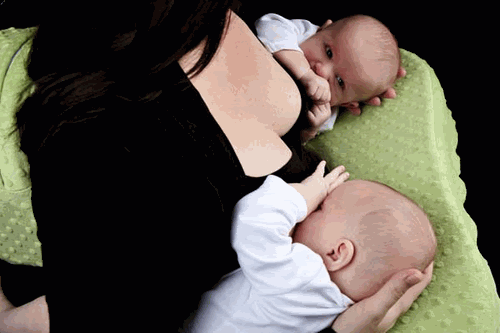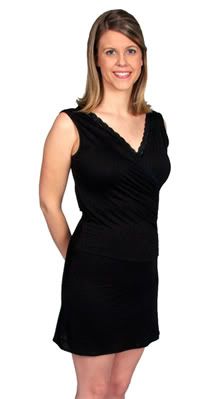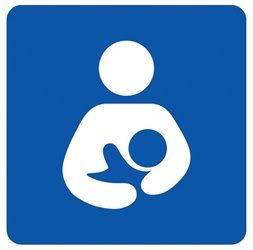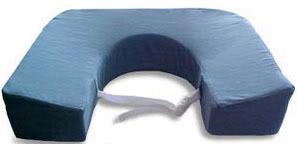Over the past seven years, I have done my fair share of breastfeeding. During that time period I nursed four children and overcame several obstacles. My oldest son I nursed for 12 months, my twins for 21 months and my youngest for 23 months. While I certainly don't call myself an expert, I do have almost five collective years of breastfeeding experience that I can share with others. Breastfeeding isn't always easy, but one can work through most challenges with the right support and knowledge to help them.
Can I breastfeed if my child has food sensitivities?
It may not be easy, but yes you can continue to breastfeed if you can adjust your diet accordingly. When W was three months old, I noticed a small amount of blood in his stool. We were immediately in the pediatrician's office where he told us that my son had a cow's milk protein intolerance. This is not the same as an allergy. His digestive system could not break down that protein which then irritated his intestines causing colicky symptoms and the blood. Our pediatrician said to cut out all milk products from my diet. After doing that and waiting two weeks, things had not improved. I was then told to remove soy products from my diet as well and we were referred to a pediatric gastroenterologist (GI). The first GI we so was an awful jerk. He told me that I might as well just stop breastfeeding because there is no benefit to the child after 3 months old. Say what? Yes, a licensed doctor told me this. I left his office so confused and in tears. I was already supplementing with special formula since I was working full time and pumping wasn't giving me enough milk to send to daycare. I battled with the idea of just quitting all together. Then I went to see a second GI. She was amazing and these few words are what really helped me and gave me the strength to push through: "You are doing a great job mom. Keep doing what you are doing." And so I did. After a few weeks being soy free as well as dairy free, we saw an improvement. The blood stopped. The colic stopped.
Cutting things like dairy and soy from your diet is not as easy as saying no more cheese, milk or tofu. You really have to start reading labels and scrutinizing every ingredient. I found that so many processed foods contain some sort of milk derivative and even more of them contain some form of soy. On the positive side, it will drastically cut back on your consumption of processed foods, which is a very good thing. And as a double bonus, you will lose weight. I went down to what I weighed before I got married, which was a nice side effect. Whole foods will be your new best friends and you will be able to find some minimally processed foods to accompany them.
 |
| Pillow available at DoubleBlessings.com |
Absolutely! When I found out I was having twins,many people just assumed I would need to formula feed. Being the internet junkie that I am, I did some research and learned that nursing twins or even higher order multiples, is very much possible. Some women choose to nurse their twins one at a time or simultaneously, only you can decided which works best for you. I also discovered that there is a nursing pillow made specifically for breastfeeding (and bottle feeding) twins. With this pillow I was able to nurse my twin boys at the same time. I preferred feeding them at the same time, otherwise I felt like was nursing all day long. I was very fortunate that I never had to supplement with formula and was able to breastfeed them up until they weaned at 21 months old. However, some women might not be able to exclusivity breastfeed twins so please know that it is more than OK to supplement. It can also give mom a much needed break from time to time.
Can I breastfeed if I have breast implants?
While I personally don't have experience with this, I know the question of nursing with implants comes up a lot so I wanted to go over it. Many women can breastfeed even with implants, but there is no guarantee. If you are considering implants but also hope to nurse a child someday, one important thing to discuss with your surgeon is placement of the incision. Many surgeons prefer to to go with an incision near the areola because it hides the scar well. However, this can damage the milk ducts, so it is best to discuss another location with your doctor. You will also want to go over the placement of the implants. Placing them under the pectoral muscle will reduce the pressure they put on the mammary glands. Some woman are also concerned that if an implant leaks it may contaminate their breast milk. The chances of an implant rupturing are slim. If you have a saline implant and rupture occurs it absorbed by the woman's body. Since the solution is just water and salt, it will not negatively affect your milk. It is important to note that woman who breastfeed with implants may be more prone to engorgement. I always found that if I was engorged, using warm compresses while massaging always worked well.
Can I breastfeed if I had a breast reduction?
Breastfeeding after a breast reduction surgery may be possible, but once again there are no guarantees. The main issue would be if any milk ducts or nerves were damaged or cut during surgery. There is always some milk ducts cut during this type of procedure. What will affect how much milk your baby can get is how many ducts were cut and if any of them have recanalized. If your surgeon is able to preserve the major nerves then you have a good chance of being able to breastfeed successfully. You will want to discuss this at length with the surgeon both before and after your surgery.
The most important thing to have while breastfeeding through any situation is a good support network. Surround yourself with family and friends who will only be positive and support your decision to breastfeed. Explain to them why breastfeeding is important to you and why you need them to be supportive of that. Often times when challenges arise, some people may encourage you to just stop breastfeeding and switch to formula. That is fine if that is what you want to do. But remember that the choice is YOURS not theirs.
If you have successfully breastfed through any of these challenges or other ones, I would love to hear from you! How were you able to work through it? Any tips or advice for new moms?
This post was brought to you by BreastImplants.org.






 August is Breastfeeding Awareness month and I have been meaning to write up my story literally all month. But what can I say, I can be a procrastinator at times. So here it is nearly the end of August and I am finally getting to it.
August is Breastfeeding Awareness month and I have been meaning to write up my story literally all month. But what can I say, I can be a procrastinator at times. So here it is nearly the end of August and I am finally getting to it. 









